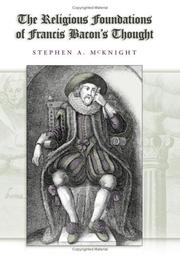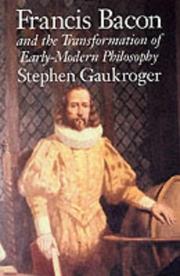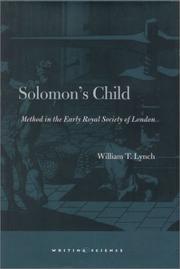| Listing 1 - 10 of 17 | << page >> |
Sort by
|
Book
ISBN: 1282975293 9786612975295 0739144839 9780739144831 9780739144817 0739144812 9781282975293 6612975296 Year: 2010 Publisher: Lanham Lexington Books
Abstract | Keywords | Export | Availability | Bookmark
 Loading...
Loading...Choose an application
- Reference Manager
- EndNote
- RefWorks (Direct export to RefWorks)
Francis Bacon's 'Inquiry Touching Human Nature' is an engagement at a fundamental level with the political and philosophic thought of one of the founders of modernity, Francis Bacon. Bacon had a comprehensive vision of the human situation. And because he saw the costs or dangers of modern life as clearly as he predicted its achievements and boons, Bacon is a thinker who addresses directly and deeply our own perplexities.
Bacon, Francis, --- Bacon de Verulam, François --- Bacon, François

ISBN: 0826264999 9780826264992 0826216099 9780826216090 Year: 2006 Publisher: Columbia, Mo. University of Missouri Press
Abstract | Keywords | Export | Availability | Bookmark
 Loading...
Loading...Choose an application
- Reference Manager
- EndNote
- RefWorks (Direct export to RefWorks)
"Presents close analysis of eight of Francis Bacon's texts in order to investigate the relation of his religious views to his instauration. Attempts to correct the persistent misconception of Bacon as a secular modern who dismissed religion in order to promote the human advancement of knowledge"--Provided by publisher.
Philosophy. --- Mental philosophy --- Humanities --- Bacon, Francis, --- Bacon de Verulam, François --- Bacon, François --- Religion.
Book
ISBN: 9781438454177 9781438454184 143845418X 1438454171 Year: 2015 Publisher: New York, N.Y. SUNY Press
Abstract | Keywords | Export | Availability | Bookmark
 Loading...
Loading...Choose an application
- Reference Manager
- EndNote
- RefWorks (Direct export to RefWorks)
Comprehensive in its ambitions and meticulous in its approach, The Political Philosophy of Francis Bacon is a new and unique interpretation of one of early modernity's more important thinkers. Whereas recent works on Bacon tend to confine themselves either to interpreting his historical context or to considering the founder of Baconianism from the perspective of one work in particular or the history of science in general, Tom van Malssen argues, through detailed and provocative interpretations of a number of Baconian writings, that the unity of Bacon's thought can only be revealed if these writings are read in historical and philosophical conjunction as well as on the assumption that they are all somehow part of the whole of Bacon's political philosophy. In addition to restoring Bacon to the pantheon of great philosophers, Van Malssen demonstrates that a proper understanding of Bacon's political philosophy contributes significantly to our understanding of the nature of philanthropic science, the modern project, and ultimately ourselves.
Political philosophy. Social philosophy --- Bacon, Francis --- Political science --- Political philosophy --- Philosophy. --- Bacon, Francis, --- Bacon de Verulam, François --- Bacon, François

ISBN: 0521805368 0521801540 0511017782 1280430400 0511047614 0511173814 0511612680 0511302215 051115304X 1107122740 9780521805360 9780511612688 9780521801546 9780511017780 051103234X 9780511032349 9781107122741 9781280430404 9780511047619 9780511173813 9780511302213 Year: 2001 Publisher: Cambridge Cambridge University press
Abstract | Keywords | Export | Availability | Bookmark
 Loading...
Loading...Choose an application
- Reference Manager
- EndNote
- RefWorks (Direct export to RefWorks)
This ambitious and important book, first published in 2001, provides a truly general account of Francis Bacon as a philosopher. It describes how Bacon transformed the values that had underpinned philosophical culture since antiquity by rejecting the traditional idea of a philosopher as someone engaged in contemplation of the cosmos. The book explores in detail how and why Bacon attempted to transform the largely esoteric discipline of natural philosophy into a public practice through a program in which practical science provided a model that inspired many from the seventeenth to the twentieth centuries. Stephen Gaukroger shows that this reform of natural philosophy was dependent on the creation of a new philosophical persona: a natural philosopher shaped through submission to the dictates of Baconian method. This book will be recognized as a major contribution to Baconian scholarship, of special interest to historians of early-modern philosophy, science, and ideas.
Bacon, Francis --- Bacon, Francis. --- Philosophy, Modern. --- Philosophy, Modern --- Philosophy & Religion --- Philosophy --- Bacon, Francis, --- Philosophy. --- History. --- Bacon de Verulam, François --- Bacon, François --- Modern philosophy --- Arts and Humanities
Book
ISBN: 1351144715 1351144723 1351144707 1281834297 9786611834296 0754693678 9780754693673 9780754662525 0754662527 9781351144704 9781351144728 9781351144698 1351144693 9781351144711 1138357707 Year: 2008 Publisher: Aldershot, England ; Burlington, VT : Ashgate Pub.,
Abstract | Keywords | Export | Availability | Bookmark
 Loading...
Loading...Choose an application
- Reference Manager
- EndNote
- RefWorks (Direct export to RefWorks)
This study re-evaluates the religious beliefs of Francis Bacon and the role which his theology played in the development of his program for the reform of learning and the natural sciences, the Great Instauration. Bacon's Instauration writings are saturated with theological statements and Biblical references which inform and explain his program, yet this aspect of his writings has received little attention. Previous considerations of Bacon's religion have been drawn from a fairly short list of his published writings. Consequently, Bacon has been portrayed as everything from an atheist to a Puritan; scholarly consensus is lacking. This book argues that by considering the historical context of Bacon's society, and his conversion from Puritanism to anti-Calvinism as a young man, his own theology can be brought into clearer focus, and his philosophy more properly understood. After leaving his mother's household, Bacon underwent a transformation of belief which led him away from his mother's Calvinism and toward the writings of the ancient Church Fathers, particularly Irenaeus of Lyon. Bacon's theology increasingly came to reflect the theological interests of his friend and editor Lancelot Andrewes. The patristic turn of Bacon's belief in the last two decades of the reign of Elizabeth significantly affected the development of his philosophical program which was produced in the first two decades of the Stuart era. This study then examines the theology present in the Instauration writings themselves and concludes with a consideration of the effect which Bacon's theology had on the subsequent direction of empirical science and natural theology in the English context. In so doing it not only offers a new perspective on Bacon, but will serve as a contribution toward a better understanding of the religious context of, and motivations behind, empirical science in early modern England.
Bacon, Francis, --- Bacon de Verulam, François --- Bacon, François --- Religion and science. --- Theology. --- Christianity and science --- Geology --- Geology and religion --- Science --- Science and religion --- Christian theology --- Theology --- Theology, Christian --- Christianity --- Religion --- Religious aspects

ISBN: 0804780226 0585457816 9780585457819 0804732914 9780804780223 Year: 2001 Publisher: Stanford, Calif. Stanford University Press
Abstract | Keywords | Export | Availability | Bookmark
 Loading...
Loading...Choose an application
- Reference Manager
- EndNote
- RefWorks (Direct export to RefWorks)
This book challenges the accepted view of the early Royal Society of London that holds that its fellows did not seriously attempt to implement Francis Bacon’s program for the methodological reform of the sciences. Instead, the book shows that Bacon’s program shaped the Society’s earliest work in important, if often contradictory, ways as fellows wedded Bacon’s ideas to their various interests and problem areas. Developing Bacon’s program in different directions resulted in a richer understanding of his method than the undirected empiricism often associated with his name. The author demonstrates that Bacon’s call for a focus on “things themselves” was built upon three distinct images of objects of knowledge, in opposition to recent accounts that focus on the collective witnessing of matters of fact. He identifies at the core of Bacon’s method a threefold metaphorical ontology of objects of knowledge and corresponding objectivities. The book reveals a picture of the Royal Society as more sophisticated and unified than previously depicted, while simultaneously demonstrating how the fellows’ development of Bacon’s legacy ultimately pulled in different directions. Specular objects of knowledge privileged passive observation and justified an empiricist objectivity. Manipulated objects of art or manual objects emphasized an engaged, constructivist objectivity in which knowing is doing. And, a vision of underlying forms as generative objects of knowledge, which could be combined like letters of the alphabet to produce phenomena at will, defined a theoretical concept of objectivity. These components of Bacon’s method inform in varying ways the early publications of the Royal Society by John Evelyn, Robert Hooke, John Wilkins, Thomas Sprat, and John Graunt, which are examined in detail to demonstrate the collective negotiation of an ambitious inductive program employing hypotheses, active powers, and the disciplined use of analogy. Examining the Royal Society’s activity in the areas of horticulture, experimentation, language reform, cultural criticism, and political arithmetic, the author synthesizes philosophical and sociological approaches to science in developing a new understanding of the Royal Society and its legacy for science, culture, and politics.
Science --- Natural science --- Natural sciences --- Science of science --- Sciences --- Methodology --- History --- Bacon, Francis, --- Bacon de Verulam, François --- Bacon, François --- Royal Society (Great Britain) --- Royal society --- Great Britain --- Intellectual life
Book
ISBN: 1282602748 9786612602740 9047442318 9789047442318 6612602740 9789004170506 9004170502 Year: 2008 Publisher: Leiden Boston Brill
Abstract | Keywords | Export | Availability | Bookmark
 Loading...
Loading...Choose an application
- Reference Manager
- EndNote
- RefWorks (Direct export to RefWorks)
The essays in the present volume attempt to historically reconstruct the various dependencies of philosophical and scientific knowledge of the material and technical culture of the early modern era and to draw systematic conclusions for the writing of early modern history of science. The divisive transformation of humanist scholarly culture, the Scholastic school philosophy, as well as magic in the form of a philosophy of practice is always associated with the work of Francis Bacon. All of these essays in this volume reflect the close interaction between technical models and knowledge production in natural philosophy, natural history and epistemology. It becomes clear that the technological developments of the early modern era cannot be adequately depicted in the form of a pure history of technology but rather only as part of a broader, cultural history of the sciences. Contributors include: Todd Andrew Borlik, Arianna Borrelli, Thomas Brandstetter, Daniel Damler, Luisa Dolza, Moritz Epple, Berthold Heinecke, Dana Jalobeanu, Jürgen Klein, Staffan Müller-Wille, Romano Nanni, Jarmo Pulkkinen, Pablo Schneider, Andrés Vaccari, Benjamin Wardhaugh, Sophie Weeks, and Claus Zittel.
Mechanik. --- Naturwissenschaften. --- Technik. --- Technischer Fortschritt. --- Technology --- Applied science --- Arts, Useful --- Science, Applied --- Useful arts --- Science --- Industrial arts --- Material culture --- Technology and civilization --- History --- Philosophy. --- Bacon, Francis. --- Bacon, Francis, --- Bacon de Verulam, François --- Bacon, François
Book
ISBN: 1611476046 9781611476040 9781611476033 1611476038 1611478081 9781611478082 Year: 2013 Publisher: Madison Lanham, Maryland
Abstract | Keywords | Export | Availability | Bookmark
 Loading...
Loading...Choose an application
- Reference Manager
- EndNote
- RefWorks (Direct export to RefWorks)
Rhetoric and the Familiar examines the rhetorical practice of Francis Bacon and John Donne in both their writing and public speaking. It explores how their rhetorical planning negotiates the need both to use and combat familiar ideas, images, and emotions, when engaging different audiences. The book's main selling points are that it explores well-known texts from the neglected angle of faculty psychology. Its ability to illuminate familiar ground in an important but neglected way will be its main selling point in the academic market.
English language --- Rhetoric. --- Bacon, Francis, --- Donne, John, --- Donn, John, --- Done, John, --- Donn, Dzhon, --- Dann, Dzhon, --- Донн, Джон, --- Bacon de Verulam, François --- Bacon, François --- Literary style. --- Knowledge --- Psychology. --- Germanic languages
Book
ISBN: 1501723421 9781501723421 9781501723414 1501723413 9781501723407 1501723405 9781501723407 Year: 2018 Publisher: Ithaca, NY
Abstract | Keywords | Export | Availability | Bookmark
 Loading...
Loading...Choose an application
- Reference Manager
- EndNote
- RefWorks (Direct export to RefWorks)
In Light without Heat, David Carroll Simon argues for the importance of carelessness to the literary and scientific experiments of the seventeenth century. While scholars have often looked to this period in order to narrate the triumph of methodical rigor as a quintessentially modern intellectual value, Simon describes the appeal of open-ended receptivity to the protagonists of the new science. In straying from the work of self-possession and the duty to sift fact from fiction, early modern intellectuals discovered the cognitive advantages of the undisciplined mind. Exploring the influence of what he calls the "observational mood" on both poetry and prose, Simon offers new readings of Michel de Montaigne, Francis Bacon, Izaak Walton, Henry Power, Robert Hooke, Robert Boyle, Andrew Marvell, and John Milton. He also extends his inquiry beyond the boundaries of early modernity, arguing for a literary theory that trades strict methodological commitment for an openness to lawless drift.
Empiricism in literature. --- Philosophy of nature in literature. --- Observation (Scientific method) --- English literature --- Literature and science --- Science --- History --- History and criticism. --- Methodology --- Bacon, Francis, --- Influence. --- England --- Intellectual life --- Bacon de Verulam, François --- Bacon, François --- nonchalance, affect theory, experimental science, Michel de Montaigne, renaissance literature.
Book
ISSN: 00680346 ISBN: 9400753500 9400797753 9400753519 1283936070 Year: 2013 Volume: v. 298 Publisher: New York : Springer,
Abstract | Keywords | Export | Availability | Bookmark
 Loading...
Loading...Choose an application
- Reference Manager
- EndNote
- RefWorks (Direct export to RefWorks)
This book is a study of the scientific revolution as a movement of amateur science. It describes the ideology of the amateur scientific societies as the philosophy of the Enlightenment Movement and their social structure and the way they made modern science such a magnificent institution. It also shows what was missing in the scientific organization of science and why it gave way to professional science in stages. In particular the book studies the contributions of Sir Francis Bacon and of the Hon. Robert Boyle to the rise of modern science. The philosophy of induction is notoriously problematic, yet its great asset is that it expressed the view of the Enlightenment Movement about science. This explains the ambivalence that we still exhibit towards Sir Francis Bacon whose radicalism and vision of pure and applied science still a major aspect of the fabric of society. Finally, the book discusses Boyle’s philosophy, his agreement with and dissent from Bacon and the way he single-handedly trained a crowd of poorly educated English aristocrats and rendered them into an army of able amateur researchers.
Bacon, Francis, 1909-1992 -- Exhibitions. --- Boyle, Robert, 1627-1691. --- Science -- Early works to 1800. --- Science. --- Science --- Physical Sciences & Mathematics --- Philosophy & Religion --- Sciences - General --- Philosophy --- History --- Philosophy. --- Bacon, Francis, --- Boyle, Robert, --- Normal science --- Philosophy of science --- T. E., --- E., T., --- R. B. --- B., R. --- Person of quality, --- Person of honour, --- Boyle, R. --- Fellow of the Royal Society, --- Boyle, Robertus, --- T. H. R. B. --- B., T. H. R. --- Bacon de Verulam, François --- Bacon, François --- Philosophy and science. --- Philosophy of Science. --- Science and philosophy
| Listing 1 - 10 of 17 | << page >> |
Sort by
|

 Search
Search Feedback
Feedback About UniCat
About UniCat  Help
Help News
News